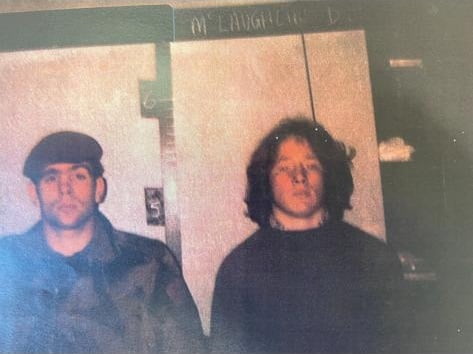
Soldier 229 with 16 year old Denis McLaughlin
Soldier 229 sadistically tortured civilians, including 16 year old Denis McLaughlin who had a short time earlier witnessed at close range a number of youths shot dead on Rossville Street. Soldier 229 was prepared to lie on oath to ensure that innocent civilians received 6 month prison sentences for riotous behaviour.
MR BRIAN G. McCARTNEY: … That is a statement in relation to the arrest of Denis McLaughlin in keeping with statements that you prepared in respect of the other three; you have seen them all this morning; is that correct?
SOLDIER 229: A. At the risk of repeating myself, this all was covered … earlier and all of these three arrest reports were also placed on this screen and I am almost sure I answered this.
Q. You did, but the one thing you did not answer was this, you see at the bottom of the statement it says this: “This statement signed by me, is true to the best of my knowledge and belief and I make it knowing that if it is tendered in evidence, I shall be liable to prosecution if I have wilfully stated in it anything which I know to be false or do not believe to be true.” That is dated the 30th day of January 1972. So even though you knew that the contents of that — those arrest pro formas and the contents of those statements were untrue, you nevertheless were prepared to make statements to that effect; you were prepared to risk prosecution, possible imprisonment yourself in order to put three innocent men in the dock; you were prepared to lie and you signed a declaration to that effect; did you not?
A. The declarations were there to be seen by all.
Q. And you signed it knowing that what it testified to was untrue; is that not right?
A. It would appear so.
Q. It is not a question of appearance, it is a fact; you are a liar and a proven liar and someone who was prepared to see three innocent men placed in the dock for something, on your word, for something they never did; you are a proven liar and you were prepared to lie to see those men go to prison because that was part of the operation upon which you were engaged in order to make sure it was successfully completed, you were prepared to lie; is that not right?
A. I do not believe so.
Q. Perjure yourself in a court of law, you were prepared to do that in order to guarantee the success of this so-called military operation. In fact, not only were you prepared to do that to these men, but you decided to kill time by torturing them; is that not right?
A. It is not.
Q. One of these men fainted in your presence; is that not correct, a 16-year-old youth, depending on you to look after his welfare properly, assigned to you, and what did you do when he fainted, you held him up because you did not believe him? What invariably happens to somebody when they faint? What happens when they faint? They fall to the ground; is that not right?
A. Normally, yes.
Q. Did he do that; he fell to the ground?
A. He did, yes.
Q. And you caught him and you held him there, you dangled him there; is that not right?
A. Once again, I think we have already covered this: I did not believe that he was properly fainted, I believe that he was faking part of it and I just held him up.
Q. What is the first thing somebody who has fainted asks for, a glass of water; is that not right, because their mouth is dry? What is the first thing you give to somebody who has normally fainted: a glass of water; is that not right? You sit them down and offer them a glass of water, a decent, Christian act. Even soldiers and prisoners of war are entitled to that level of decency, are they not, 229? But not if they are your prisoners, no, no, no, because when he asked you for a glass of water, you very kindly spat in his mouth, a vile reprehensible contemptuous act of violence, a dirty, unforgivable act which no decent man would own up to.


You must be logged in to post a comment.